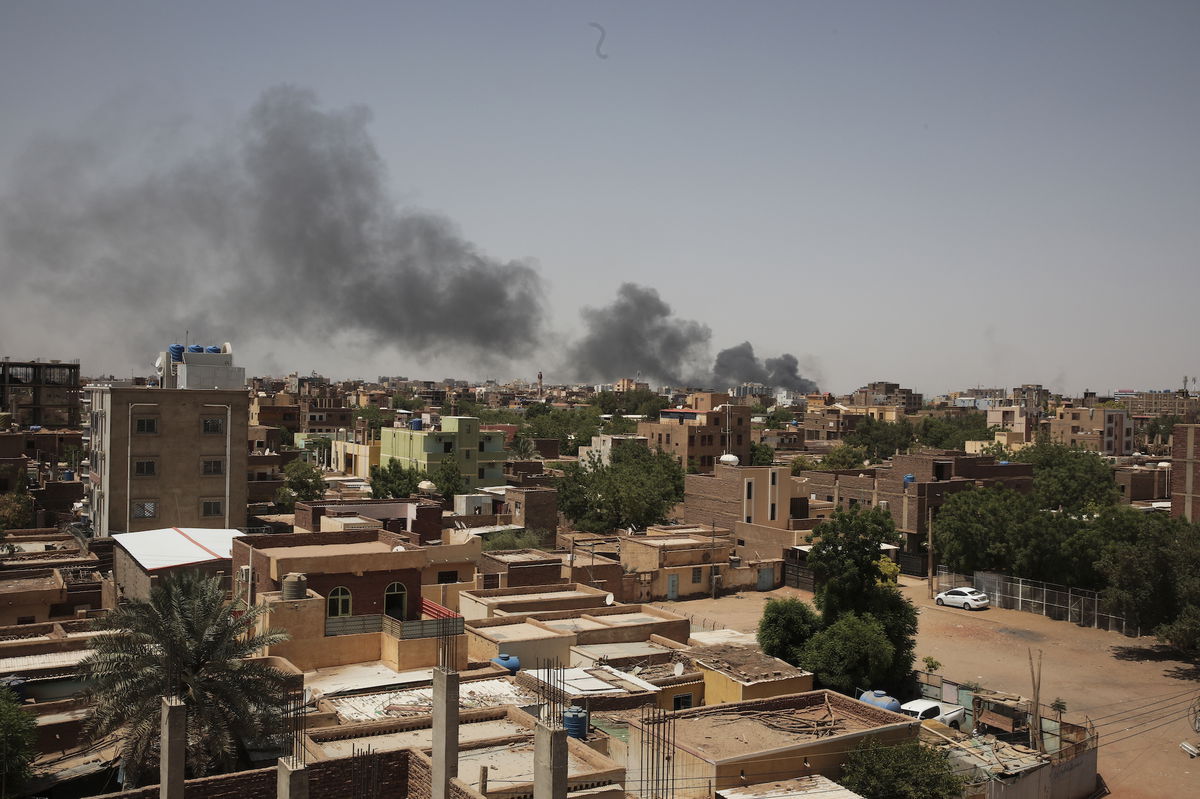Foreign powers rescue nationals while Sudanese must fend for themselves

(CNN) -- Foreign powers have rescued embassy staff and nationals caught in Sudan's deadly fighting, even as on the ground many Sudanese are stuck in deteriorating conditions.
US special forces helped bring almost 100 people -- mostly US embassy staff, as well as a small number of diplomatic professionals from other countries -- to safety on Saturday, US officials said.
Many other nations are scrambling to do the same, with more than 1,000 European Union nationals evacuated so far.
Evacuations have been complicated by ongoing clashes. The two sides at the center of more than a week of fighting -- Sudan's army and a paramilitary group called the Rapid Support Forces (RSF) -- blamed each other after a French evacuation convoy came under fire trying to leave Sudan, with one French national injured.
One staff member of the Egyptian embassy in Sudan was also shot and injured during an evacuation operation, Cairo's foreign ministry said.
Meanwhile, many Sudanese civilians are either trapped in their homes with dwindling food, or desperately looking to find exit routes out of the country via its land borders, with the capital's main international airport still shuttered.
The flurry of operations came on the ninth day of clashes in Khartoum.
Sudan's military leader, Gen. Abdul Fattah al-Burhan, and commander of the RSF, Lt. Gen. Mohamed Hamdan, seized control of the country in a military coup in 2021 and were due to hand over power to a civilian government but turned on each other instead.
More than 420 people have been killed and 3,700 injured in the fighting, according to the World Health Organization (WHO). The humanitarian situation on the ground is deteriorating without access to medical services, and with many left stranded without food or water.
A series of ceasefires, including the latest called for the Muslim holiday Eid al-Fitr, have been broken.
Residents in parts of Khartoum told CNN early on Sunday morning that there were no signs that the cessation of hostilities was being adhered to, as they awoke to aerial attacks, heavy artillery, explosions and gunfire. They relayed that clashes were raging around the military headquarters and presidential palace in the city center.
'Complex and rapid' operations
Despite the steep risks, foreign governments continue to announce rescue missions to pull their citizens out.
US citizens in Sudan were advised they could join evacuation convoys organized by the UAE and Turkey on Sunday, with the US government saying it has no plans for its own citizen evacuation.
There are an estimated 16,000 American citizens in Sudan -- most of whom are dual nationals.
Some countries have already successfully carried out evacuations, including the United Kingdom, Spain, Jordan, Italy, France, Denmark and Germany. Several of their convoys also carried citizens from other countries, including Swedes, Portuguese, Mexicans, Palestinians, Iraqis and Syrians.
EU High Representative for Foreign Affairs and Security Policy Josep Borrell said Monday that more than 1,000 EU nationals have been evacuated so far, calling it a "successful operation."
"It has been a long weekend, a long and intense weekend trying to take our people out of Sudan," Borrell said, thanking France in particular for bringing out other non-French foreign nationals.
More evacuations are still being planned or are underway for the Netherlands, Belgium, Norway, Germany, Sweden, Egypt, Turkey, Libya, India, Russia, Australia, Japan, China and the Philippines.
The German Armed Forces evacuated 311 people on Monday morning, including Germans as well as evacuees from over 20 other nations. A Spanish military plane with 34 Spaniards and 38 citizens from 11 other nations landed in Madrid on Monday morning, according to Spain's foreign ministry.
Uganda is evacuating 300 of its citizens via buses to the Ethiopian border, where they will fly out from Ethiopian city of Gondar, Dickson Ogwang, the head of the chancery of the Ugandan embassy in Khartoum, told CNN.
Meanwhile, up to 50 Irish citizens have been extracted from Sudan in the last 24 hours with the assistance of the French and Spanish governments, the country's foreign minister said Monday.
In Rome, a military flight with 98 Italians onboard as well as 30 other nationals is expected to land at early evening local time at Ciampino Airport. Japan's Ministry of Foreign Affairs said that some Japanese nations evacuated from Sudan had arrived in Djibouti, with the help of the French government.
'Stay and risk starvation, or be killed by a stray bullet'
But as foreign nationals rush out on evacuation planes, millions of Sudanese citizens have been left to fend for themselves -- stranded for days in their homes and uncertain of how to make their way out to safety.
Isma'il Kushkush, a Sudanese-American journalist based in Khartoum, was trapped with 29 residents, including children and foreign nationals, in a building in downtown Khartoum near the presidential palace for days.
"No power or water for five days. Using little water remaining in water tank. Running out of food rations. Unable to leave the building which is located two blocks from the presidential palace. Epicenter of the fighting since the conflict began," he said in a string of text messages to CNN. The group was later safely evacuated.
In neighborhood WhatsApp group chats and on social media, others were deliberating over where to get water, to charge phones, find medics and find safe passages out of Khartoum free of fighting. Many asked for advice on routes to Egypt on public transportation.
A woman in her 30s, who asked not to be named for security reasons, told CNN that she managed to flee Khartoum by bus to Egypt.
She said she was driven to do so by the unpredictability of the RSF and the worsening conditions in the capital.
While her family had a generator and they were able to supply water to houses in their neighborhood, it was unclear how long they would be able to carry on or when the tide of clashes might bring fighters to their doorstep.
"It was a case of do we stay and risk starvation. Or be killed by a stray bullet? ... We decided to take the risk," she said, adding that she had heard of people without food and water dying in their homes. "We just figured we were sitting ducks sheltering in our houses."
A group of her relatives, including two babies and an elderly woman with a serious medical condition, found a bus driver willing to take them to Egypt. They left Friday morning and arrived at the border on Saturday evening; the group was only stopped once by Sudan's armed forces in Omdurman, she said.
But they struggled to get men without visas into Egypt and a few people without passports -- including newborn babies -- were turned away.
"They had to be left behind. And we're still trying to work out how to get them paperwork to get them across the border," she said.

